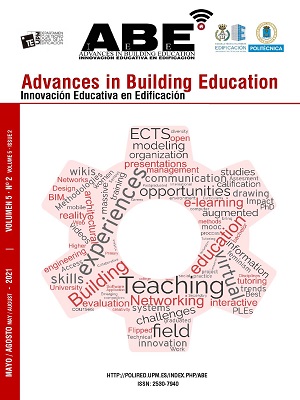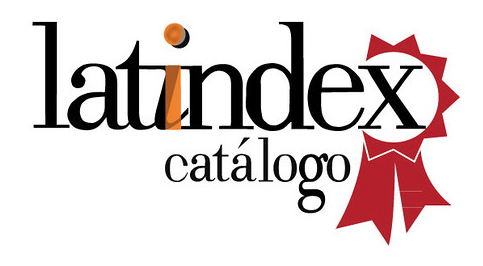Education for sustainable development in building higher studies
DOI:
https://doi.org/10.20868/abe.2021.2.4720Palabras clave:
Learning, Innovation teaching, Architecture, ConstructionResumen
Abstract
UNESCO highlights the crucial role of higher education in achieving each of the 17 SDGs (Sustainable Development Goals). Thus, students should acquire the knowledge and skills needed to promote sustainable development. In this context, the University of the Basque Country (UPV/EHU) has developed the Campus Bizia Lab programme as an initiative derived from the Project Erasmus University Educators for Sustainable Development. The aim of the initiative has been to promote a collaborative process between academic staff, service and administrative staff and students, creating a transdisciplinary community to respond to sustainability challenges within the university. In the framework of the programme, pedagogical approaches for sustainable development have been developed for the Grades of Technical Architecture and Civil Engineering at the University of the Basque Country, UPV/EHU. The paper presents the methodologies developed and analyses the effect on learning process
Descargas
Referencias
UNESCO (2018). Education for sustainable development (ESD) beyond 2019. 204 EX/28, Paris.
S. Sterling, “Chapter 5 - Higher education, sustainability, and the role of systematic learning” in Higher Education and the Challenge of Sustainability: Problematics, Promise and practice (Peter Blaze Corcoran & Arjen E.J. Wals Eds.), 49-70, Netherlands, 2004.
A. Leicht, J. Heiss, and W. J. Byun in Issues and trends in Education for sustainable Development. Published by the United Nations Educational, Scientific and Cultural Organization, Paris, 2018.
R. Lozano, M. Y. Merrill, K. Sammalisto, K. Ceulemans, and F. J. Lozano, “Connecting Competences and Pedagogical Approaches for
Sustainable Development in Higher Education: A Literature Review and Framework Proposal,” Sustainability, 9, 1889-1904, 2017.
W. Lambrechts, I. Mulá, K. Ceulemans, I. Molderez, and V. Gaeremynnck, “The integration of competences for sustainable development in higher education: an analysis of bachelor programs in management,” Journal of Cleaner Production, 48, 65-73, 2013.
D. Cotton and J. Winter, “It´s not just bits of paper and light bulbs: A review of sustainability pedagogies and their potential for use in higher education” in Sustainability Education: Perspectives and Practice across Higher Education (Jones, P., Selby, D., Sterling, S., Eds.), Earthscan: London, UK; New York, NY, USA, 2010.
M. Murga-Menoyo, “Learning for Sustainable Economy: Teaching of Green Competencies in the University,” Sustainability 6, 2974-2992, 2014.
J. Segalás, D. Ferrer-Balas, and K. F. Mulder, “What do engineering students learn in sustainability courses? The effect of the pedagogical approach,” Journal of Cleaner Production, 18, 275-284, 2010.
E. R. Kahu, C. Stephens, L. Leach, and N. Zepke, “The engagement of mature distance students,” Journal Higher Education Research & Development, 32(5), 791-804, 2013.
W. A. Astin, “Student Involvement: A Developmental Theory for Higher Education,” Journal of College Student Development, 40(5), 518-529, 1999.
J. B. Biggs and K. F. Collis, Evaluating the quality of learning: The SOLO taxonomy (Structure of the Observed Learning Outcome) pp. 23-29. In Academic Press Inc. New York, 1982.
H. S. Barrows, “A taxonomy of problems-based learning methods,” Medical Education, 20(6), 481-486, 1986.
M. Garmendia, J. I. Barragués, K. Zuza, and J. Guisasola, “Faculty development project for Science, Mathematics and Technology teachers on Problem and Project Based Learning methodologies,” Enseñanza de las Ciencias, 32(2), 113-129, 2014.
J. A. Llorens-Molina, “El aprendizaje basado en problemas como estrategia para el cambio metodológico en los trabajos de laboratorio,” Quimica Nova, 994-999, 2010.
B. Marlies, F. Dochy, and K. Struyven, “The effects of different learning environments on students´ motivation for learning and their achievement,” British Journal of Educational Psychology, 484-501, 2013.
S. M. M. Loyens, S. H. Jones, J. Mikkers, and T. van Gog, “Problem-based learning as a facilitator of conceptual change,” Learning and Instruction, 38, 34-42, 2015.
Yepez-Salmon, “Construction d’un outil d’évaluation environnementale des écoquartiers: vers une méthode systémique de mise en oeuvre de la ville durable,” Universitè Bordeaux, 2011.
M. Lotteau, G. Yepez-Salmon, and N. Salmon, “Environmental assessment of sustainable neighborhood projects through NEST, a decision support tool for early stage urban planning,” Procedia Engineering, 115, 69–76, 2015.
F. Zamora-Polo and J. Sánchez-Martín, “Teaching for a better world. Sustainability and sustainable development goals in the construction of a change-maker university,” Sustainablity, 11(15), 4224, 2019.
Descargas
Publicado
Número
Sección
Licencia
ABE (Advances in Building Education / Innovación Educativa en la Edificación) no aplica cargo alguno a los autores por procesar o publicar un artículo y provee acceso abierto (Open Access) inmediato a su contenido. Todo el contenido está disponible gratuitamente sin cargo para el usuario o su institución. Se permite a los usuarios leer, descargar, copiar, distribuir, imprimir, buscar o vincular a los textos completos de los artículos, o utilizarlos para cualquier otro propósito lícito, sin pedir permiso previo del editor o el autor. Esto está de acuerdo con la definición de acceso abierto de la BOAI.
1. Los autores conservan los derechos de autor y garantizan a la revista el derecho de una Licencia Creative Commons Atribución / No Comercial / No Derivadas 4.0 Internacional (CC BY NC ND) que permite a otros compartir el trabajo con un reconocimiento de la autoría y uso no comercial.
2. Los autores pueden establecer por separado acuerdos adicionales para la distribución no exclusiva de la versión de la obra publicada en la revista (por ejemplo, situarlo en un repositorio institucional o publicarlo en un libro).
Salvo indicación contraria, todos los contenidos de la edición electrónica se distribuyen bajo una licencia de uso y distribución “Creative Commons".














